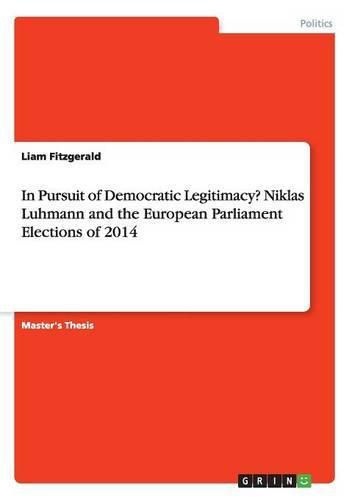Readings Newsletter
Become a Readings Member to make your shopping experience even easier.
Sign in or sign up for free!
You’re not far away from qualifying for FREE standard shipping within Australia
You’ve qualified for FREE standard shipping within Australia
The cart is loading…






Master’s Thesis from the year 2015 in the subject Politics - International Politics - Topic: European Union, grade: 1,3, Queen’s University Belfast (School of Politics, International Studies and Philosophy), language: English, abstract: This thesis analyses the European Parliament elections of 2014 through the lens of Niklas Luhmann’s theory of legitimacy. These elections differed from earlier ones due to the introduction of Spitzenkandidaten, lead candidates, for the position of Commission President by the majority of European party groups. In order to provide the historical context for the elections of 2014, this thesis presents the development of the European Parliament and argues that the search for political legitimacy at the European level was the driving force behind this development, including the recent introduction of Spitzenkandidaten. The thesis stipulates that Luhmann’s work on legitimacy in particular has undeservedly been mostly overlooked in European studies. In order to test the applicability of his work in the context of European democracy, five themes are developed that collectively characterise Luhmann’s legitimacy theory. These themes are used as the basis for a thematic analysis of documents of the Spitzenkandidaten idea’s main proponents, these being the European Parliament and Commission and the Spitzenkandidaten of the three parties that are considered to be the most supportive of European integration - the European People’s Party, EPP, the Party of European Socialists, PES, and the Alliance of Liberals and Democrats for Europe, ALDE. The document analysis confirms the hypothesis that Luhmann’s work deserves far more attention from European integration studies than it has so far received.
$9.00 standard shipping within Australia
FREE standard shipping within Australia for orders over $100.00
Express & International shipping calculated at checkout
Master’s Thesis from the year 2015 in the subject Politics - International Politics - Topic: European Union, grade: 1,3, Queen’s University Belfast (School of Politics, International Studies and Philosophy), language: English, abstract: This thesis analyses the European Parliament elections of 2014 through the lens of Niklas Luhmann’s theory of legitimacy. These elections differed from earlier ones due to the introduction of Spitzenkandidaten, lead candidates, for the position of Commission President by the majority of European party groups. In order to provide the historical context for the elections of 2014, this thesis presents the development of the European Parliament and argues that the search for political legitimacy at the European level was the driving force behind this development, including the recent introduction of Spitzenkandidaten. The thesis stipulates that Luhmann’s work on legitimacy in particular has undeservedly been mostly overlooked in European studies. In order to test the applicability of his work in the context of European democracy, five themes are developed that collectively characterise Luhmann’s legitimacy theory. These themes are used as the basis for a thematic analysis of documents of the Spitzenkandidaten idea’s main proponents, these being the European Parliament and Commission and the Spitzenkandidaten of the three parties that are considered to be the most supportive of European integration - the European People’s Party, EPP, the Party of European Socialists, PES, and the Alliance of Liberals and Democrats for Europe, ALDE. The document analysis confirms the hypothesis that Luhmann’s work deserves far more attention from European integration studies than it has so far received.